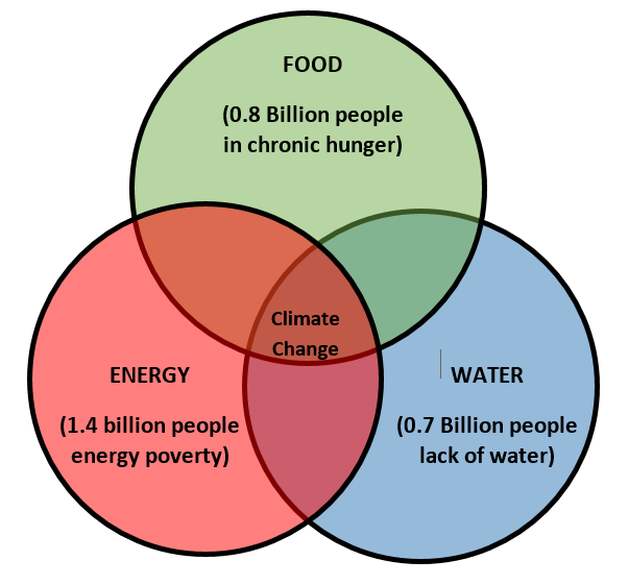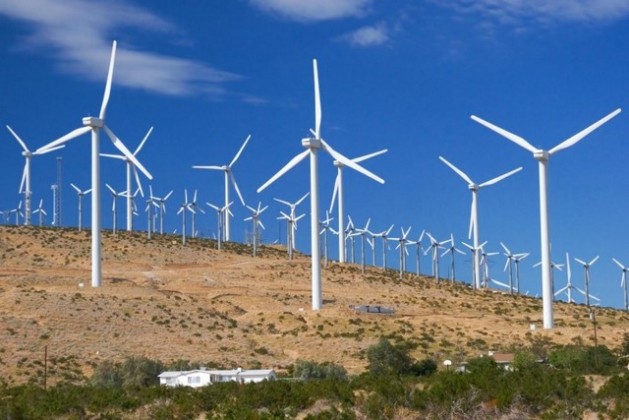Overcoming the Challenges: Securing the World’s Food, Energy and Water

SURREY, United Kingdom, Oct 13 (IPS) - According to the United Nations estimates almost 800 million people suffer from chronic hunger (1 in every 9 persons on the planet) and a higher number (1 in 3) suffer from malnutrition. 1 in every 5 persons (1.4 billion people) have no access to electricity worldwide (living with energy poverty) whilst 1 in 10 people do not have access to clean water. With climate change, this situation is worsening across many parts of the world.
Food, Energy and Water (FEW) are linked inextricably and are important requirements for national security and economic development of nations.

To make enough food for a growing world population, more water and energy are needed. To ensure water is accessible and clean for human consumption demands energy and diverts water resources from agriculture. Additionally producing energy requires water, again potentially impacting irrigation. Energy production is further constrained by the need to limit greenhouse gas (GHG) emissions. These interlinkages are intensifying in many regions around the world as demand for resources increase with population growth, changing consumption patterns, and low management efficiencies in both supply and demand in these three sectors, likely to be compounded by the impact of climate change.
Attempting to achieve sustainable management in one of these sectors independently, without addressing trade-offs, will endanger sustainability of the other two sectors. It is important therefore to adopt a nexus-thinking approach in the planning and management to achieve intelligent synergies and fair trade-offs between all three sectors.
At the centre of the FEW nexus lies the global challenge of climate change and poverty. According to the UN Declaration on Social development in 1995, poverty, whether it is absolute poverty, extreme poverty, or abject poverty is a condition characterised by severe deprivation of basic human needs, including food, safe drinking water, sanitation facilities, health, shelter, education and information.
Poverty therefore is the biggest challenge to humanity. The poor suffer from it while the rich fear it. It creates social divisions, fierce competition, greed, tensions and political instability among other societal problems. Eradicating poverty is therefore a moral responsibility and a fundamental requirement to social justice, political stability and sustainable development.
Arguably there could be perhaps two ways to reduce or eliminate poverty: One is to make everybody or every nation rich; though it is not possible politically and logistically, it would still not solve the problem of poverty due to the limited global resources and their geographical distribution and constraints.
The second way is by making the basic needs of Water, Energy and Food available and affordable to everyone. With technological advances, it is possible to achieve the latter but not the former. History shows that since the industrial revolution, science and technology have contributed hugely to reduce global poverty, improve people's health, enhance quality of life, increase education opportunities and even help bring people and nations together by reducing cultural barriers.
However, the over exploitation of science and technology has also contributed to global problems including accelerated depletion of natural resources due to increased population and human greed fuelled by the rich and technologically developed nations' desire to be richer and dominating. These activities have affected the environment negatively and resulted in the challenge of climate change and raised the question of unsustainable development.
Critical to achieving sustainability and eradicating poverty is to have sustainable energy and water supplies that have little or no geographical or climatic condition constraints. This appears near impossible or far reaching given the current rate of consumption of the world's energy and water resources and the status of scientific and technological development.
However, history tells us that humans have always found ways to advance their mission on earth by discovering alternative sources, and/or inventing new ways of doing things better. Examples include how human moved from using wood to coal and then to oil and gas before any of these resources had been completely depleted. However, the challenges, whether they are energy or water resources related have not yet disappeared.
For energy, this is so because fossil based energy sources are available in certain places around the world which presents a geographical, logistical and political constraints. Additionally they have negative impact on the environment, which has resulted in the challenge of Climate Change.

Renewable energy sources, on the other hand, whether solar, wind, tidal, hydropower, etc., though have less negative impacts on the environment; they are not free from geographical and climatic constraints regardless of their development status. In other words, they are not available to every country, never mind their still high capital and installation costs, which can be restraining factors.
The global water situation is not different from that of energy. The most populated parts of the world suffer from water shortages. Additionally, most of the larger cities in the world are located near the sea. This mainly provides an option for domestic water sourced from desalinated seawater or by long distance water transportation. Both are energy intensive processes.
The water shortage problem has negatively affected farming and agriculture activities worldwide. Globally, agriculture water constitutes about 70% of the total freshwater use. Groundwater contamination has resulted in a further reduction of water resources which were available for irrigation and exacerbated the problem of water scarcity. Tapping into seawater was considered as an option solution for freshwater supply, but as mentioned before desalination is energy intensive technology and has high installation cost, which limits its use to wealthy and oil rich countries.
Hence low cost energy is the key to a prosperous world. The world needs water and food as well among other key requirements. For water, there is plenty of it in the sea but it is not suitable for human consumption or irrigation. Hence having secure, adequate, sustainable and low cost energy source provides sustainable and affordable water. Both provides the base for food production, as there is little or no shortage of agricultural land.
Should water and energy be available, it could change people's lives. With the availability of these essential ingredients for living, health, prosperity and quality of life among other things for most people could be granted. This will also have a positive effect on the environment and helps reducing the impact of climate change.
There is a good reason for optimism that a sustainable and affordable energy source will be found. The reason for optimism is that because scientists have not exhausted all the options. More scientists are required to innovate and think out of the box including re-examination of the many of the scientific principles and the existing engineering concepts, i.e. doing perhaps more of going back to the basics and applying reverse-engineering among other approaches.
For example, in the case of energy, scientists and engineers for a long time, probably since the beginning of the Industrial Revolution, have associated energy transformation and power production to fuel consumption; e.g. burning wood, coal, oil and gas including the nuclear reaction.
This has created a resource problem as most of these sources are not available everywhere. However the renewable energy sources, though they do not involve fuel consumption, have limitations of location, weather and availability. To overcome these limitations, many of the existing political and environmental rules and regulations need to be substantially changed; which is unlikely.
This leaves us with no options but to think beyond the conventional ways. Given that accessible, affordable, secure and low cost energy is central to achieving sustainable development, energy therefore must have the highest global priority. Securing sustainable energy supplies will directly impact the security of water and food; giving the interlinked dependency of these essential needs for our modern civilisation.
Out of the box thinking suggests an energy source that has little or no constraints and that is Gravity. Gravity is everywhere and anywhere with an infinite range and no geographical nor climatic limitations. However, gravity while it powers and is responsible for many of the large scale structures in the Universe, it is largely a negative energy source for humans because of the penalties to overcome it in most human activities expect for hydropower generation and few other uses. Other sources of renewable energy that are not widely exploited include low grade heat and ocean energy.
Turning gravity to an exploitable energy source for electricity production, would present a great leap in technological advancement. Electron is a universal form of energy that is used for lighting and powering machines and devices for all uses and purposes including heating, transportation, etc. Gravity has the potential to provide electricity.
Investigating the possibility of producing electricity using gravity is currently an area of limited research. This is because the idea is largely perceived as impossible. The number of researchers who are investigating this area is very small compared to the size of the scientific community. If they succeed, the potential would be huge with a global impact and opportunities.
The challenges of Water, Energy and Food along with other challenges of Climate Change and Poverty Eradication, can then be successfully addressed. This would mark the beginning of the Sustainable Age.
This article is part of a series of stories and op-eds launched by IPS on the occasion of this year's World Food Day on October 16.
© Inter Press Service (2017) — All Rights ReservedOriginal source: Inter Press Service
 Global Issues
Global Issues